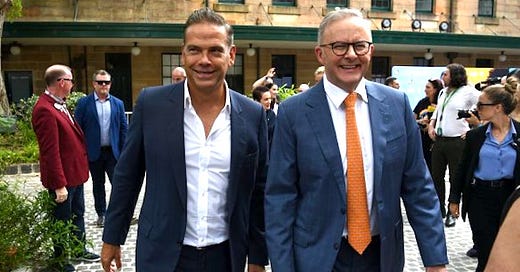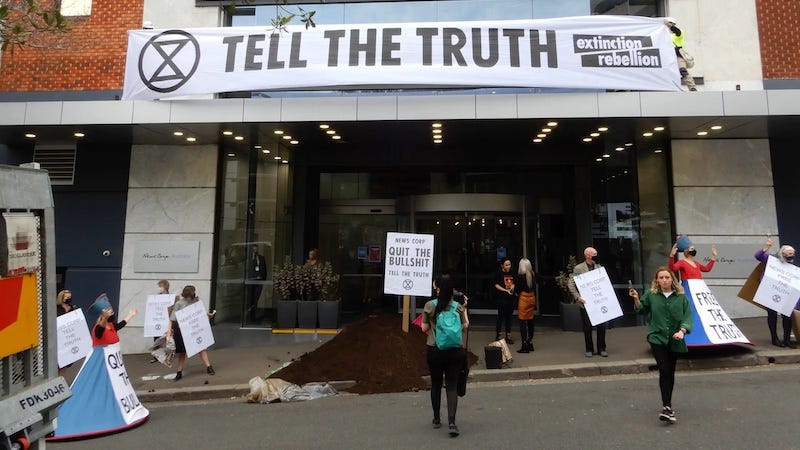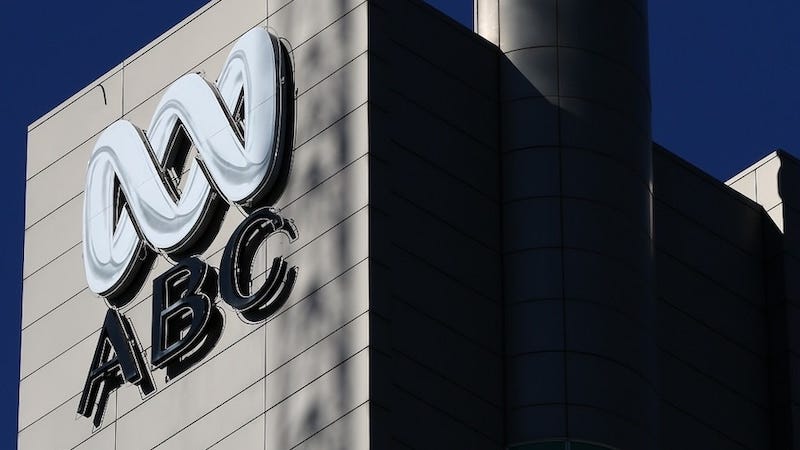Albanese’s media gamble: How appeasement has strengthened News Corporation’s grip
The Prime Minister has not only missed a crucial opportunity to reform the media but has weakened his own position.
The behaviour of the mainstream media in Australia throughout 2024 has been as troubling as ever, revealing deep flaws in the country’s media landscape and exposing the political inertia of the current Labor government on critical media reform.
Prime Minister Anthony Albanese recently said that News Corporation and the opposition were now working together “to undermine us” and that this was an embedded part of the political dynamic that the government needed to deal with – a comment he made just after attending the Murdoch family’s Christmas party.
But Albanese, after all his years in politics – almost 29 – should hardly be surprised by News Corporation’s unrelenting antagonism toward Labor governments. For decades, the modus operandi of News Corporation has been to undermine Labor whenever it holds power, a business model and a pattern so entrenched, it borders on pathological. This is not even an open secret in Australian political life: where has Albanese been for all these years, and what is the point of making such a comment six months before a federal election, when he’s has almost three years to address this issue?
Albanese’s failure to act decisively on media reform – despite ample opportunity – represents not just a missed chance but a dereliction of leadership. To publicly concede the hostile intent of News Corporation while failing to pursue meaningful reforms undermines the credibility of the government and raises broader concerns about its willingness to challenge entrenched power. Albanese personality may hope to maintain civility within politics but appeasement of News Corporation has repeatedly proven futile. This dynamic has left the government vulnerable to attacks that are as predictable as they are corrosive, perpetuating a cycle where media corporations wield outsized influence without fear of accountability.
The tools to address these imbalances have long been available. Reforms targeting media ownership concentration, journalistic behaviour, and institutional oversight are within the federal government’s reach, as they always have been. Measures to strengthen the Australian Press Council, introduce truth-in-journalism legislation, or update outdated media ownership laws could fundamentally reshape the landscape. Yet, Albanese and his government appear unwilling to disrupt the status quo, preferring to act with polite deference over bold governance.
No government is, or should be, immune from media scrutiny and healthy democracies rely on a media that holds power to account. However, the mainstream media’s behaviour in Australia has often strayed from this principle, descending instead into conservative partisanship, sensationalism, and outright hostility. The era of former Prime Minister Julia Gillard in the early 2010s remains a case study in media overreach, where editorial agendas supplanted journalistic integrity. The attacks on Gillard, often personal and irrelevant to policy, exposed a media apparatus that prioritises spectacle over substance – a pattern that continues to this day. These issues transcend political ideology; they erode public trust, distort democratic processes, and undermine accountability.
The current Labor government has failed to address these systemic flaws – not that it has even tried – and it risks perpetuating a dangerous precedent: that media conglomerates are untouchable forces, immune to regulation and accountability. Albanese’s inaction is especially egregious given the clear path for reform that is available to it and this government, like many before it, appears content to tolerate the media’s transgressions rather than confront them. But as history has shown, accommodation only emboldens those who seek to dominate political discourse for their own ends.
Albanese’s media strategy has backfired and weakened his leadership
Albanese’s approach to appeasing News Corporation and the mainstream media has proven to be a misguided and fruitless strategy that has yielded no political benefit for his government. The belief that a nudge, a wink, and a concession – whether on gambling laws, social media regulation, or tech platforms such as Meta paying for news links – could earn favourable coverage for a Labor government is a fantasy and has proven to be so. News Corporation has demonstrated time and again that it cannot be bargained with, especially by a Labor prime minister. If anything, Albanese’s overtures have only emboldened the corporation to treat him with more contempt, rendering him politically weak and exposing him to ridicule.
When Albanese pointed out the obvious – that News Corporation is actively working to undermine his government – he became the subject of derision on Sky News, further diminishing his authority. The transactional relationship Albanese seems to believe exists is, in reality, entirely one-sided: News Corporation takes, Albanese gives, and the Labor government is left empty-handed.
This is not only a tactical error; it is a fundamental misreading of the nature of media power in Australia. News Corporation is not an institution that can be placated or reasoned with; it operates with its own agenda, and that agenda is inherently hostile to Labor governments. Albanese’s failure to recognise this – or his refusal to confront it – has only made matters worse. By participating in the charade of schmoozing editors and attending social functions, he legitimises a media empire that is openly working to destroy his government. In doing so, he compromises both his leadership and the public’s trust.
The only effective way to address the behaviour of the mainstream media is to put aside the schmoozing and take up action through strong and effective legislation. Strengthening media ownership laws, enforcing truth in journalism, and ensuring adherence to ethical standards are the only meaningful responses to a media environment that has been allowed to spiral out of control.
By failing to act, Albanese has emboldened the media to push boundaries even further. Media outlets have become increasingly brazen, breaching ethical standards with impunity, knowing there will be no repercussions. The MEAA’s Code of Ethics is violated so routinely it has become irrelevant; stories built on distortion, sensationalism, and outright dishonesty slip through every day. The Australian Press Council, nominally tasked with oversight – and funded by the mainstream media – has neither the authority nor the resources to hold powerful outlets accountable. Meanwhile, the consequences of unchecked media power are not abstract; lives have been ruined, careers destroyed, and mental health crises exacerbated by irresponsible reporting. The media’s ability to do harm has escalated, yet its accountability remains stagnant.
The media will not soften its attacks in exchange for political favours, nor will it reward appeasement with even-handed reporting. The more Albanese gives, the less he gets. His failure to address the many flaws in political reporting in the mainstream media has not only cost him politically but has reinforced an imbalance of power in Australia.
The ABC of missed opportunity and the price of inaction
The Albanese government’s failure to enact meaningful media reform, despite being handed a golden opportunity, will undoubtedly go down as one of its most glaring missteps. While mainstream or legacy media is arguably diminished in its reach and influence compared to its heyday, its capacity to influence political narratives and shape public opinion remains strong. A forward-thinking prime minister would have seen this landscape as an urgent arena for reform – an opportunity to level the playing field and dismantle the undue power wielded by entrenched media conglomerates.
Michelle Rowland’s tenure as communications minister exemplifies the Albanese government’s ambivalence. Instead of addressing the critical issues of media ownership concentration, ethical breaches, and regulation, Rowland has made headlines for all the wrong reasons, attending gambling industry events and accepting donations from the industry. This passive approach signals a broader unwillingness within the government to confront media power, despite its obvious and damaging influence.
Even where the Albanese government has had direct responsibility – such as with the ABC – the decisions have reflected either complacency or capitulation. The ABC is a government-funded public broadcaster, yet its political coverage has consistently adopted a narrative more aligned with Liberal Party talking points than with balanced reporting. A prime minister aware of the importance of public broadcasting would have seized this as an opportunity for reform – restructuring the board, recalibrating management, and ensuring the ABC fulfills its mandate to serve the public interest rather than corporate agendas.
Instead, Albanese provided the ABC with additional funding over consecutive years, no strings attached, while allowing appointments such as Kim Williams, a former News Corporation executive, as chair of the board, followed by the appointment of Hugh Marks from Nine Entertainment, who gained notoriety for hosting $10,000-per-head fundraising events for the Liberal Party at Nine headquarters, and presiding over the company during a time of a wide range of workplace cultural issues, including systemic bullying, discrimination and sexual harassment.
These are baffling decisions, completely out of step with the supposed principles of a Labor government. While it could be argued that the ABC is independent of government decisions, when the Liberal Party is in government, it appoints its own people to the board of the ABC – who are hostile to the interests to the ABC and aligned to the Liberal Party – why shouldn’t a Labor government do the same, especially if its own principles align with the charter of the ABC and offer a commitment to public broadcasting and media?
This passivity has not only emboldened private media monopolies but allows them to dominate the narrative unchallenged. The Labor government’s failure to engage in even modest reforms – such as appointing individuals to the ABC board who align with its vision for public interest media – suggests that Albanese sees the ABC as a lost cause, not worth saving. This is both a strategic and moral failure. Reforming what the government directly controls, such as the ABC, would at least have been a start. Instead, the government’s inertia has allowed the media to further entrench its biases and anti-Labor agenda.
History suggests that governments, even when facing immense resistance, earn far more respect when they fight for principles than when they cower to their opponents. Whitlam’s crash through or crash ethos remains a defining example of leadership in the face of entrenched power. Even when reforms fail or meet resistance, the act of taking a stand sends a powerful message to both the media and the public. The alternative is what we see under Albanese: a government that tries to appease its detractors, only to be humiliated, mocked, and undermined in return. The consequences of this are profound, not only for the current government but for Australian democracy itself.
Leaders like Thatcher, Menzies, Keating, and even John Howard – whatever one’s opinion of their politics – were respected because they stood for something and fought unapologetically for their beliefs. Albanese, on the other hand, risks being remembered as a leader who stood for nothing when it mattered most. By failing to challenge the concentrated power of the media, he has positioned himself as weak and ineffectual, a prime minister who preferred appeasement over action, comfort over confrontation. His opponents, both political and media-based, will not reward this deference; they will exploit it.
This missed opportunity will not be easily forgiven, nor will it be forgotten. Albanese had the tools at his disposal to initiate reforms that would have addressed Australia’s media crisis and reclaimed the ABC as an institution of public trust. Instead, he squandered it, handing victory to the very media proprietors who will never stop working to undermine him. By attempting to placate media monopolies, Albanese has not only missed a crucial opportunity but has weakened his own position, ensuring that his government remains at the mercy of forces it could – and should – have challenged.










